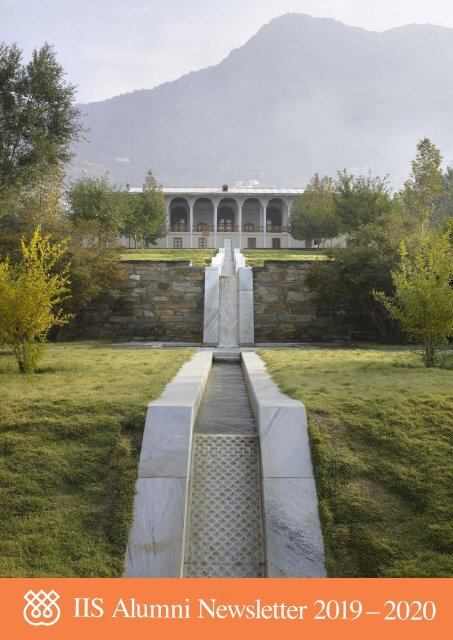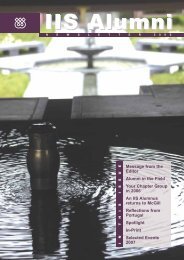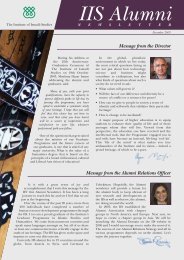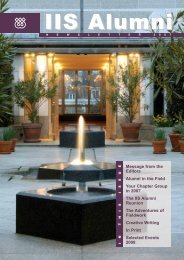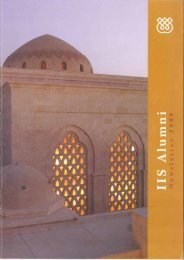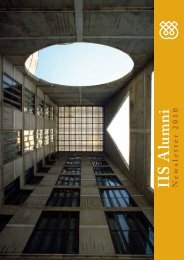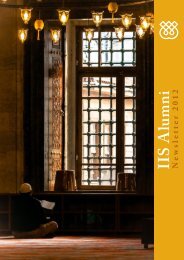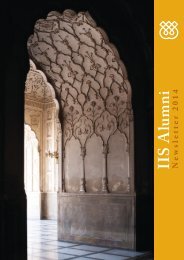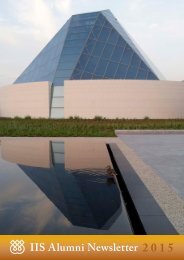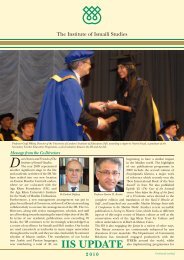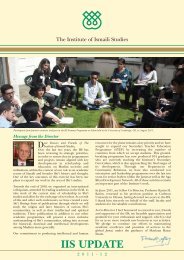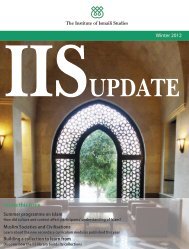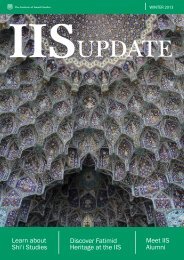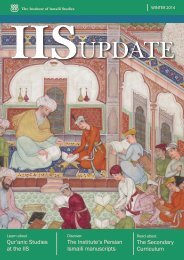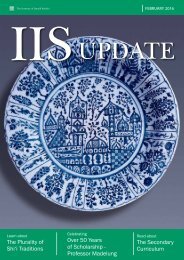Create successful ePaper yourself
Turn your PDF publications into a flip-book with our unique Google optimized e-Paper software.
<strong>IIS</strong> <strong>Alumni</strong> <strong>Newsletter</strong> 2019 – <strong>2020</strong>
MESSAGES<br />
2<br />
CONTENTS<br />
Message from the Co-Director 2<br />
Message from the <strong>Alumni</strong> Relations<br />
Coordinator 3<br />
<strong>Alumni</strong> Chapter Group Leadership<br />
for 2019 – <strong>2020</strong> 3<br />
Key Highlights from the <strong>Alumni</strong> Profile<br />
Report 2019 – <strong>2020</strong> 4<br />
Annual General Meetings:<br />
Sicily, Tajikistan, Canada 6<br />
New <strong>IIS</strong> Graduates 8<br />
<strong>Alumni</strong> Internships 2019 – <strong>2020</strong> 9<br />
Remembering Kutub Kassam 10<br />
A Renewed Commitment to Life:<br />
A Grounded-Theory Study of Suicide<br />
Attempts in Badakhshan 11<br />
Reflections on Architecture and History<br />
in Zanzibar 12<br />
Engaging the Minds of Tomorrow:<br />
A Reflection on the STEP Camps<br />
in Pakistan 13<br />
Online Discussion Boards:<br />
An Effective Classroom Pedagogical Tool 14<br />
<strong>Alumni</strong> Publications in 2019 16<br />
Publications, Papers and Presentations 17<br />
MESSAGE FROM THE CO-DIRECTOR<br />
Dear <strong>IIS</strong> <strong>Alumni</strong><br />
Being in the heart of London’s Knowledge Quarter<br />
for over two years now, The Institute of Ismaili<br />
Studies at the Aga Khan Centre has created an<br />
inviting intellectual space for building new bridges<br />
across geographies and beyond demographics to<br />
respond to the needs of our audiences.<br />
In 2019, we hosted several ground-breaking educational programmes.<br />
The <strong>IIS</strong> Early Child Development Conference brought together<br />
practitioners and coordinators from the global Ismaili community and<br />
the Aga Khan Development Network to discuss approaches for a newly<br />
developed, integrated curriculum framework. Our PhD Seminar provided<br />
<strong>IIS</strong> alumni and others, many of whom are <strong>IIS</strong> doctoral scholarship<br />
recipients, with a platform to connect with peers, present their research<br />
and receive critical feedback on their work. We also hosted our annual<br />
academic conference entitled Esoteric Cultures of Scripture that brought<br />
together some of the foremost scholars to investigate the complex interplay<br />
of scriptures that has shaped esoteric intellectual cultures and spiritualties.<br />
Through our research and publications programmes, we have been<br />
generating essential conversations about the diversity and pluralism of<br />
lived Muslim traditions and the legacy of this rich heritage. Professor<br />
Zulfikar Hirji (GPISH 1997 alumnus) published a newly edited volume in<br />
the <strong>IIS</strong> Qur’anic Studies Series (QSS), Approaches to the Qur’an in<br />
Sub-Saharan Africa. This publication presents the research of numerous<br />
international scholars to open up new discourses about Islam in sub-Saharan<br />
Africa through the examination of how Muslims in this geographical and<br />
socio-cultural context have engaged with the Qur’an, particularly trends<br />
in Qur’anic exegesis and the plurality of engagements that Muslims from<br />
diverse communities of interpretation have with the Qur’an.<br />
We recently launched the Aga Khan Library Digital Collections online<br />
in collaboration with Bloomsbury Publishing to showcase manuscripts,<br />
artwork, rare books, out-of-print publications, photographs, and maps<br />
which have been produced in different periods and areas of the Muslim<br />
world. This digital endeavour will enable international scholars, students<br />
and other interested users to access a treasure trove of primary sources for<br />
research and educational purposes. In addition, we have made available a<br />
selection of <strong>IIS</strong> publications from our back catalogue as eBooks, which are<br />
available to download from the <strong>IIS</strong> website. More titles will be available<br />
online over the coming months.<br />
I would like to take a moment to pause and remember as well as to publicly<br />
recognise the valuable contribution of scholars and friends who are no longer<br />
with us. Kutub Kassam faithfully served the <strong>IIS</strong> and the Ismaili Community<br />
for more than forty years through his work on the religious education<br />
curriculum and for many years as an Editor of many <strong>IIS</strong> publications.<br />
Raficq S Abdulla, who has contributed much to the body of knowledge<br />
on poetry, art and spirituality, had also published a work through the <strong>IIS</strong><br />
on Understanding Sharia: Islamic Law in a Globalised World, which was<br />
co-written with Dr Mohamed Keshavjee. Professor Abbas Hamdani,<br />
whose academic contributions ranged from the Fatimids to the Ikhwan<br />
al-Safa, has made many rare manuscripts available for study through<br />
the donation of his family collection to the Institute. The contributions of<br />
Kutub Kassam, Raficq Abdulla, and Professor Abbas Hamdani to Ismaili<br />
heritage and Islamic studies continue to live on through their writings and<br />
our memories of them.<br />
As we continue our journey in these unprecedented times, I would like to<br />
express my heartfelt gratitude for your continuous generosity and support<br />
to the work of the Institute towards academic excellence and service to the<br />
global Ismaili community. We hope you and your loved ones are keeping<br />
well and safe.<br />
Dr Farhad Daftary
MESSAGE FROM THE ALUMNI<br />
RELATIONS COORDINATOR<br />
Dear <strong>IIS</strong> <strong>Alumni</strong>,<br />
I would like to take this opportunity<br />
to express my gratitude to all of<br />
you as well as my colleagues in<br />
the Department of Community<br />
Relations for the support I have<br />
received in my role as the <strong>Alumni</strong><br />
Relations Coordinator since April 2019. As a recent<br />
alumnus of the GPISH programme in 2018, this role<br />
has been a significant professional milestone in my<br />
career to understand and implement the vision of the<br />
<strong>IIS</strong> through the programmes, events, and new initiatives<br />
for our global alumni body. Through these activities,<br />
the <strong>Alumni</strong> Relations Unit is committed to supporting<br />
alumni in various stages of their career and professional<br />
development, and strengthening their relationship with<br />
the <strong>IIS</strong> and various other Imamat institutions.<br />
Based on the <strong>Alumni</strong> Profile Report 2019–<strong>2020</strong>, the<br />
<strong>IIS</strong> <strong>Alumni</strong> Association now comprises over 670<br />
alumni across more than thirty countries. I am pleased<br />
to report that almost 90% of all alumni participated in<br />
the <strong>IIS</strong> <strong>Alumni</strong> Survey in December 2019, and I would<br />
like to extend a big thank you to all who completed the<br />
survey. This issue of the <strong>Alumni</strong> <strong>Newsletter</strong> provides a<br />
snapshot of alumni-related events and activities that have<br />
taken place in 2019 and the contributions of the alumni<br />
community to research and scholarship. A key highlight<br />
were the Annual General Meetings held in Sicily,<br />
Tajikistan, and Canada, which were organised by the<br />
Chapter Group Leadership in Europe, Asia, and North<br />
America, respectively. I would like to encourage you to<br />
work with your chapter group leaders to bring your ideas<br />
and expertise in the organisation of these alumni events<br />
so that they can be an even greater benefit to you and as<br />
many of your fellow alumni as possible.<br />
The <strong>IIS</strong> <strong>Alumni</strong> Community Portal (https://iisalumni.org)<br />
is our online social platform for you to stay connected with<br />
the Institute and the global alumni community. This portal<br />
is increasingly becoming a positive social networking<br />
resource, and we are looking to improve it every year. As<br />
of December 2019, 640 users, including 593 alumni (87%),<br />
are registered on the portal. In 2019, 350 events (online<br />
courses, webinars, book launches) and 484 professional<br />
opportunities were shared with alumni via the portal. We<br />
welcome feedback and suggestions that will allow alumni<br />
to make full use of the portal’s features. Please get in touch<br />
with us to pass on your recommendations.<br />
All alumni will be able to access the Aga Khan Centre by<br />
providing their name, programme and year of graduation,<br />
and photo ID to security at reception. <strong>Alumni</strong> will be able<br />
to access the first three floors, including reference access<br />
to the Aga Khan Library.<br />
If you have any queries, comments, or suggestions, please<br />
do contact the <strong>Alumni</strong> Relations Office at alumni@iis.ac.uk<br />
Congratulations to our new alumni and welcome to the<br />
<strong>IIS</strong> <strong>Alumni</strong> Association!<br />
Hussain Daya<br />
<strong>Alumni</strong> Relations Coordinator<br />
GPISH 2018 Alumnus<br />
ALUMNI CHAPTER GROUP<br />
LEADERSHIP FOR 2019 – <strong>2020</strong><br />
ASIAN CHAPTER GROUP<br />
ACG President: Nazira Sodatsayrova<br />
Nazira graduated from STEP in<br />
2009 and received her PhD in Higher<br />
Education, Migration and Cultural<br />
Studies from the University of Tsukuba,<br />
Japan, in 2018. She is currently working<br />
as a STEP Teacher in Sydney, Australia.<br />
ACG Secretary: Salman Rajani<br />
Salman graduated from GPISH in 2018 and<br />
completed his MSc in Education from the<br />
University of Oxford. He currently works<br />
as a Lecturer and Research Associate at the<br />
Greenwich University, Pakistan Campus,<br />
and serves as an Honorary Regional<br />
Chairperson for ITREB Pakistan.<br />
EUROPEAN CHAPTER GROUP<br />
ECG President: Nahida Ahmed<br />
Nahida Ahmed graduated from GPISH in<br />
2017 and completed her MA in Language<br />
Documentation and Description at SOAS.<br />
She is currently pursuing a PhD in<br />
Language Documentation and Description<br />
at SOAS.<br />
ECG Secretary: Shameer Prasla<br />
Shameer graduated from STEP in 2009<br />
and has worked as a STEP teacher for<br />
ITREB Pakistan. He is currently the<br />
Coordinator for the STEP Liaison Unit of<br />
the Department for Community Relations<br />
at the <strong>IIS</strong>.<br />
NORTH AMERICAN CHAPTER GROUP<br />
NACG President: Alim Fakirani<br />
Alim graduated from the STEP<br />
programme in 2010. He is currently<br />
working as a STEP teacher in British<br />
Columbia and has previously taught in<br />
Quebec for ITREB Canada.<br />
NACG Secretary: Basira Rahimi<br />
Basira graduated from STEP in 2014 and<br />
has been working as a STEP teacher in<br />
Calgary, Alberta, for ITREB Canada.<br />
During 2019, Basira worked as a STEP<br />
teacher in New Zealand.<br />
CHAPTER GROUP LEADERSHIP<br />
3
ANNUAL ALUMNI PROFILE REPORT 2019 – <strong>2020</strong><br />
<strong>Alumni</strong> Body<br />
The global <strong>IIS</strong><br />
alumni body comprises 678<br />
graduates from the five human<br />
resource development<br />
programmes implemented by<br />
the <strong>IIS</strong> since the early 1980s<br />
Academic<br />
Achievements<br />
33 alumni received<br />
awards and grants, including<br />
fellowships and scholarships<br />
35 alumni published papers<br />
in academic journals<br />
43 alumni presented papers<br />
at international conferences<br />
5 alumni published<br />
monographs<br />
New <strong>Alumni</strong><br />
27 students graduated<br />
from STEP and have<br />
joined ITREBs in their<br />
home countries<br />
10 students have completed<br />
their final year of GPISH<br />
and five have undertaken<br />
internships with the <strong>IIS</strong><br />
and AKDN<br />
Employment<br />
A significant majority<br />
of our alumni<br />
(583 or 86%)<br />
are currently employed,<br />
with more than half<br />
(366 or 54%)<br />
in professional employment<br />
with Imamat institutions<br />
KEY HIGHLIGHTS FROM<br />
THE ANNUAL ALUMNI PROFILE REPORT<br />
2019 – <strong>2020</strong> 1<br />
4<br />
1<br />
587 alumni (87% of <strong>IIS</strong> alumni body) responded to the <strong>IIS</strong> <strong>Alumni</strong> Survey 2019. Orange markers on the map indicate where alumni live and blue markers<br />
indicate where some alumni are employed.
Seven alumni completed<br />
their doctoral studies<br />
Voluntary<br />
Contributions<br />
188 alumni were able to<br />
contribute voluntarily to significant<br />
projects or assignments in<br />
Imamat institutions<br />
83 alumni were appointed<br />
to senior voluntary roles within<br />
Jamati institutions, AKDN, and<br />
external organisations<br />
Aslisho Qurboniev (GPISH 2013): University of Cambridge,<br />
Thesis: Traditions of Learning in Fatimid Ifriqiya: Networks,<br />
Practices and Institutions<br />
Farah Virani (STEP 2009): York University, Thesis: Who am<br />
I?: The Emotional Situations and Identity Constructions of<br />
Canadian-Born Ismaili Youth<br />
Fayaz S. Alibhai (GPISH 2002): University of Edinburgh,<br />
Thesis: People, Places, and Texts:<br />
Re/presenting Islam in Edinburgh, Scotland<br />
Hafeez Merchant (STEP 2011): Georgia State University,<br />
Thesis: Becoming Mentors: Mentor<br />
Praxis and Self-Directed Development<br />
Nausheen Hoosein (STEP 2014): University of Texas, Thesis:<br />
Triumphant Towers and Sites of Spolia in Almohad Spain and<br />
Morocco: The Case of the Sevillian Minaret<br />
Salman Khawaja (STEP 2009): University of Missouri, Thesis:<br />
Naturalising Epistemology<br />
Shumaila Hemani (GPISH 2009): University of Alberta,<br />
Thesis: Faqirs at the Edge of Modernity<br />
in Contemporary Sindh<br />
Continuing<br />
Education<br />
124 alumni are<br />
pursuing or have completed<br />
further studies on a part-time<br />
or full-time basis<br />
ANNUAL ALUMNI PROFILE REPORT 2019 – <strong>2020</strong><br />
5
ANNUAL GENERAL MEETINGS<br />
ANNUAL GENERAL MEETINGS: SICILY, TAJIKISTAN, CANADA<br />
The European Chapter Group’s<br />
Annual General Meeting (ECG AGM)<br />
The ECG AGM was held in Palermo, Sicily, Italy, from<br />
28th June to 1st July 2019. The theme of the AGM was<br />
The Fatimids in Sicily and the Influence of Islamic Art in<br />
Urban Palermo. Guest speakers for the ECG AGM were<br />
Dr Shainool Jiwa, Dr Delia Cortese, Dr Alessandro Cancian,<br />
and a keynote address by Dr Aziz Esmail. Two alumni<br />
presented their work: Ismaili History in Family Records<br />
by Dr Karim Javan (GPISH 2004) and Sunni Tradition<br />
under the Fatimid Caliphate by Dr Aslisho Qurboniev<br />
(GPISH 2014).<br />
Sixteen alumni attended the ECG AGM from UK, France,<br />
and Sweden. The group visited different historical sites,<br />
which highlighted the traces of the Fatimids throughout<br />
Arab-Norman Palermo.<br />
Al Noor Daod Nathoo, GPISH 2013:<br />
“The backdrop of the Mediterranean Sea<br />
provided an ideal setting to revisit Fatimid history,<br />
especially in Sicily. The educational field trips<br />
to the Cappella Palatina and Monreale allowed<br />
us to see and experience what was presented by<br />
our fantastic guest speakers. I especially enjoyed<br />
the Opera dei Pupi because it gave us a taste of<br />
the local culture. The chapter group meetings are<br />
always amazing opportunities for the alumni to<br />
meet old friends and forge new friendships. ”<br />
6
The North American Chapter Group Annual<br />
General Meeting (NACG AGM)<br />
The NACG AGM was held at the Aga Khan Garden,<br />
University of Alberta Botanic Garden, Edmonton, Canada,<br />
from 27th to 28th August 2019. The theme of the AGM<br />
was Cross-Cultural Adaptations. The guest speakers were<br />
Dr Karim Dharamsi, Chair of General Education and<br />
Professor of Philosophy at Mount Royal University, and<br />
Professor Mojtaba Mahdavi, Chair of Islamic Studies at<br />
the University of Alberta. Four alumni presented some<br />
of their recent and current work: Naheed Mukhi (GPISH<br />
2017) on Including Religious Pluralism in Early Childhood<br />
Curriculum: Madrassa ECD Program in East Africa; Farhad<br />
Mortezaee (GPISH 2005) on Islamic Garden Design;<br />
Perwaiz Hayat (McGill 1987) on Mughal Gardens with<br />
Special Reference to the Shalamar Gardens; Aleem Karmali<br />
(GPISH 2009) on Islamic Gardens: Catalysts for Change.<br />
Thirty-five alumni attended the NACG AGM from Canada<br />
and the United States.<br />
Shazia Manji, STEP 2016:<br />
“The Aga Khan Garden serves as an incredible<br />
example of synergy, bringing together traditional<br />
features of Islamic landscape and architecture<br />
and adapting them for a northern climate. For<br />
me, the NACG AGM was a great opportunity to<br />
reconnect with fellow alumni and see how they<br />
are taking what they have learned from the <strong>IIS</strong><br />
and using it to further enhance our institutions.<br />
This year’s AGM allowed an opportunity to<br />
reconnect with friends and colleagues in a<br />
unique space for intellectual discussion.”<br />
ANNUAL GENERAL MEETINGS<br />
The Asian Chapter Group’s Annual General Meeting<br />
(ACG AGM)<br />
The ACG AGM was held at the Ismaili Centre in Dushanbe, Tajikistan,<br />
from 17th to 19th August 2019. The theme of the AGM was Social,<br />
Political and Religious History of the Shia Ismaili Communities of<br />
Central Asia and the Contemporary Issues Affecting the Community.<br />
Guest speakers for the ACG AGM included Dr Daniel Beben, Assistant<br />
Professor of History at the School of Humanities and Social Sciences,<br />
Nazarbayev University, Kazakhstan, Mr Kishwar Abdulalishoev, CEO<br />
of Aga Khan Foundation Tajikistan, and Mansour Shakarmamadov,<br />
ITREB scholar Tajikistan (GPISH 2004). The ACG AGM was attended<br />
by 33 alumni from Australia, India, Pakistan, Singapore, and Tajikistan.<br />
The group had field visits to the Sufi shrine of Yaqub Charkhi and<br />
Gurminj Museum to learn about Central Asian culture and life in<br />
Tajikistan, which showcased local efforts to preserve musical and cultural<br />
traditions in the region. During these visits, Tajik alumni took a leading<br />
role in facilitating conversations between the local leaders of the shrine<br />
to educate non-Tajik alumni about how the shrine plays an important role<br />
in the religious life of local Tajik. One of the highlights for all alumni was<br />
the musical performance by the hosts of the Gurminj Museum with local<br />
instruments from Tajikistan and greater Central Asia more widely.<br />
Shabinaaz Dhamani, STEP 2018:<br />
“In the exquisite combination of elegance,<br />
colours and culture meshed in the space<br />
of the Ismaili Centre Dushanbe, the<br />
warm interactions with fellow alumni,<br />
the magical tunes of the musicians with<br />
the daf and the rubab at the Gurminj<br />
Museum, the serenity at the Sufi shrine<br />
of Yaqub Charkhi, the stories of survival<br />
and thriving of the living traditions of<br />
the Ismailis in Tajikistan, the endeavours<br />
of the AKDN in the development of the<br />
country ... all of this came together to<br />
make it one of the finest and the most<br />
memorable experiences of my life.”<br />
7
NEW <strong>IIS</strong> GRADUATES<br />
NEW <strong>IIS</strong> GRADUATES<br />
GPISH 2019 Graduates:<br />
Aisha Ali, Huma Gul, Kainat Jalaluddin, Rayhon Jonbekova, Nazma Kazani, Zehra Shallwani, Samra Siraj, Suhaib Ud Din,<br />
Tabish Virani, Mishaal Zulfiqar<br />
STEP 2019 Graduates:<br />
Faridoon Haidary, Sadia Rajwani, Alyssa Karim Lalani, Mina Safdari, Karishma Nazir Nathoo , Karishma Nizar Patel, Ruhee<br />
Farooqshah Kassam, Sahista Siraj Chawdawala, Samaneh Niktinat, Afshan Fazal, Aly Ahad Mawji, Anita Ali, Auranzaib Noor<br />
Ali, Rozina Qasim, Seema Ghadir, Zohra Parveen, Zulaira Khimani, Farida Abdulodzhonova, Nigora Dorobekova, Shahzeen<br />
Hanif Rashid, Afzan Perwaiz Tharani, Sanya Tejani, Sofia Ali, Tanisha Akbar Hassam<br />
8
ALUMNI INTERNSHIPS 2019 – <strong>2020</strong><br />
Each year, the <strong>Alumni</strong> Relations Unit creates internship<br />
opportunities for new GPISH graduates to facilitate their<br />
transition from student to professional life and further their<br />
career development. With the support of the <strong>IIS</strong>, AKDN HR<br />
and the Department of Jamati Institutions, the ARU developed<br />
internship opportunities for five GPISH graduates in 2019:<br />
Nazma Kazani – Aga Khan Academy, Mozambique<br />
Rayhon Jonbekova – Aga Khan Foundation, UK<br />
Samra Siraj – Aga Khan Agency for Habitat, Pakistan<br />
Suhaib Ud-Din – Central Asian Studies Unit, <strong>IIS</strong><br />
Zehra Shallwani – Tourist Promotion Services, Pakistan<br />
ALUMNI INTERNSHIPS<br />
REFLECTIONS ON INTERNSHIPS BY ALUMNI<br />
Samra Siraj<br />
The <strong>Alumni</strong> Internship Programme has provided me with the opportunity<br />
to bridge the gap between my academic training and a professional career<br />
in international development. The well-designed placement along with a<br />
responsive procedure to guide me at each successive step has ensured that graduates<br />
like me opt for the relevant AKDN organisation and gain the best exposure in their<br />
fields of interest. This internship has offered me a springboard to seek an exciting<br />
career with the Aga Khan Agency for Habitat, Pakistan. It has provided me with an<br />
unparalleled opportunity to learn a great deal, make professional connections, and<br />
mentorship that has given me further clarity for not just my future career ambitions,<br />
but also for my life goals and aspirations. I am extremely grateful to the <strong>IIS</strong> for<br />
carving out this unique opportunity, without which I would not have realised the<br />
intensity of my interest in this sector. This placement makes GPISH a complete package to equip students with intellectual<br />
foundations for thriving in the professional world as well as contributing meaningfully towards the betterment of<br />
communities and serving the core philosophy and purposes of GPISH.”<br />
Rayhon Jonbekova<br />
The three-month internship with the AKF UK Partnerships Unit was extremely<br />
valuable to further expand my knowledge and skills in international development,<br />
such as strategic planning, donor relationship, resource mobilisation,<br />
grants management, finance management, as well as proposal development related to<br />
programmes in Central Asia, South Asia, East Africa and the Middle East. I was exposed<br />
to projects across many development sectors: energy, health and nutrition, education and<br />
early childhood development, water and sanitation, infrastructure and livelihood, climate<br />
change and disaster risk reduction, financial inclusion and economic development.<br />
By working at the Aga Khan Centre (AKC), I had a chance to build relationships with<br />
colleagues in the AKF UK office and with those in other AKDN institutions to learn<br />
about their work while enjoying the beautiful atmosphere of the AKC. Last, but not least,<br />
the internship enabled me to get a Partnership Officer position with AKF Tajikistan. The experience gained in the AKF UK<br />
office prepared me to transition smoothly to my new job and make valuable contributions to the AKDN through my work<br />
with AKF.”<br />
9
REMEMBERING KUTUB KASSAM<br />
10<br />
REMEMBERING KUTUB KASSAM<br />
Fayaz S. Alibhai – Class of GPISH 2002<br />
‘Kill your darlings, kill your darlings, even when it breaks<br />
your egocentric little scribbler’s heart, kill your darlings.’<br />
Sound advice from Stephen King’s On Writing: A Memoir of<br />
the Craft (2012), often proffered to writers. And where authors<br />
are resolutely unable to kill their darlings, it falls to their longsuffering<br />
editors to do so. In his role as Senior Editor at the<br />
Department of Academic Research and Publications (DARP)<br />
at the <strong>IIS</strong>, Kutub Kassam was a magnificent editor and if he<br />
suffered from reconciling authorial vagaries with institutional<br />
sensibilities, he certainly did not show it.<br />
Dr Isabel Miller, Senior Editor<br />
“Kutub was a most conscientious and thorough editor,<br />
unfailingly ready to devote the time and care that each<br />
project required and deserved. And I try to follow his<br />
example, especially as I now find myself with the daunting<br />
task of editing some of the Ismaili Texts and Translations,<br />
which was the series that in particular he worked on. I am<br />
very conscious of the need to maintain his high standards<br />
and continue to ensure that material is published with the<br />
same level of excellence that his work enjoyed.”<br />
Kutub and I were colleagues. In fact, it was on his recommendation<br />
to Dr Daftary, Co-Director of the <strong>IIS</strong>, that I joined the editorial<br />
team in 2006. Kutub’s first task for me was to review a manuscript<br />
he had just received. Eager to prove myself, I was rather blunt<br />
in my assessment. Kutub was kinder, and more forgiving of its<br />
shortcomings (although we never did publish the book). This, I was<br />
to realise, was an unfailing characteristic of Kutub across all the<br />
various projects we worked on together. Still, his gentle approach<br />
did not diminish his critique and I remember many afternoons<br />
together poring over the merits of manuscripts that came our<br />
way. These were spent in his office, from which one could step<br />
out, almost illicitly it felt, onto the terrace abutting it at the grand<br />
building that then housed the <strong>IIS</strong> at Grosvenor Gardens. Kutub<br />
had a keen mind and a wry sense of humour. A private person,<br />
he did not write or say very much about himself. He was a poet,<br />
too, and although only a select few were privy to his poetry, they<br />
remembered of it fondly a fiery passion that belied his mild exterior.<br />
Dr Reza Shah-Kazemi, Senior Research Associate<br />
“Kutub was much more than an editor – as many of us<br />
who have had the honour of working with him will testify.<br />
When he ‘edited’ a book, he entered into the universe<br />
of meaning from which the author was extracting a<br />
particular set of facets, and, like an artist, Kutub would<br />
help us to paint a much better, more refined, more<br />
inspiring portrait of what we were trying to convey. In<br />
my own case, the book Justice and Remembrance owes<br />
more to Kutub’s vision than my own efforts. This is not<br />
hyperbole. I had written a couple of conference papers<br />
on Imam Ali, and it was Kutub who saw that, with the<br />
addition of an introductory chapter, these papers could<br />
be put together as a book. Being a complete beginner<br />
as regards Imam Ali – as I was then and remain now<br />
– I did not dare to presume I was capable of writing<br />
a book on him. But it was Kutub’s encouragement,<br />
indeed, his insistence, that resulted in my consent to his<br />
proposal to expand the two essays into a book. And, in<br />
the process of expansion, it was he who continuously<br />
acted as my intellectual confidant, helping me to think<br />
through the subtle esoteric implications of Imam Ali’s<br />
inspiring teachings. I cannot thank Kutub enough, and<br />
shall remain forever indebted to him, not only for his<br />
help in creating this particular book, but for all of the<br />
illuminating discussions with him on a wide variety of<br />
spiritual subjects during the nearly two decades that we<br />
worked together at the <strong>IIS</strong>.”<br />
Kutub loved words. Not bombastic rhetoric, but the careful and<br />
measured discourse of one determined to find the right word<br />
and turn of phrase that was his even in the way he made it<br />
an author’s. If his empathy, curiosity and patience enabled him<br />
to get into an author’s head, then his sensitivity to the text he<br />
was responsible for and to the audience it was intended for was<br />
equally evident. Authors and translators, particularly of the<br />
Ismaili Texts and Translations Series, benefited hugely from<br />
his critical pen and quiet exposition. He often rewrote and<br />
reframed entire passages to better put across authors’ points<br />
of view and arguments. Wise authors welcomed and accepted<br />
these interventions knowing their work was richer for it.<br />
Much editorial work is invisible, at least in its final, published<br />
form. Aside from corrections, edits, and amends that need to<br />
conform to a particular style, there are also all those numerous<br />
queries, comments, conversations, and debates that take place<br />
– not only in the marginalia of the manuscript, but also over<br />
emails and phone calls in the many scripted and scriptorial<br />
dances between author, editor, and publisher. I do not know<br />
that Kutub was ever credited enough, not least because he<br />
often brought a novel and engaging perspective to the issues<br />
at hand. I often wished he would write more for – and as –<br />
himself. Still, he seemed to derive greater satisfaction from<br />
engaging meaningfully than in merely imposing. In that way,<br />
he was an enabler – quiet, confident, and distinctly unshowy<br />
– and he has left a lasting impact not only on me but on other<br />
colleagues at the <strong>IIS</strong>.
A RENEWED COMMITMENT TO LIFE:<br />
A GROUNDED-THEORY STUDY OF SUICIDE ATTEMPTS IN BADAKHSHAN<br />
Shahnaz Savani – Class of WTEP 1993<br />
Suicide is a serious and complex<br />
problem facing the world. Most<br />
suicides occur in Asia and yet<br />
research has predominantly<br />
studied suicides in the West.<br />
Suicide in Central Asian countries<br />
is poorly researched, and there is<br />
virtually no research on suicide<br />
in Badakhshan. This research is<br />
an exploratory qualitative study<br />
on the phenomenon of suicide in<br />
Badakhshan, Tajikistan, using a social justice lens. It seeks<br />
to understand the perspectives on the experience of suicide<br />
among individuals who have attempted suicide in Badakhshan<br />
within their socio-cultural context. The participants in this<br />
study developed their understanding of suicide through their<br />
own religious and moral code, the societal norms and their<br />
values and beliefs regarding suicide. The objectives of the<br />
study are to describe the lived experiences of individuals<br />
who have made a suicide attempt in Badakhshan and identify<br />
the factors that contributed to the attempt using Grounded<br />
Theory methodology. Fieldwork for this study was conducted<br />
over two months in Badakhshan, Tajikistan. Interviews were<br />
conducted with 12 participants (seven female and five male)<br />
who had attempted suicide.<br />
Three core categories—experiencing extreme hardship,<br />
getting help and factors associated with suicide—formed the<br />
bedrock of the emerging theory. The categories coalesced to<br />
form a linear social process of experiencing extreme hardship,<br />
managing to survive, encountering an added stressor and<br />
making an attempt. Most participants did not get help because<br />
they did not believe that others could help them, or they did not<br />
wish to burden others. Having easy access to means of suicide<br />
and impulsivity were significant risk factors associated with<br />
suicide. The resilience of the participants, the sheer will to<br />
keep going, and having a strong moral stance on suicide were<br />
protective factors for suicide in Badakhshan.<br />
This study was the first to examine suicide in the socioreligious-cultural<br />
context of Badakhshan and lays the<br />
foundation for intervention research to be initiated. It provides<br />
a glimpse into lived experiences of suicide in Badakhshan<br />
from the perspective of those who have experienced it. A<br />
renewed commitment to live is a grounded theory of struggle,<br />
survival, experiencing a suicide attempt and emerging<br />
stronger by making a renewed commitment to live.<br />
SHAHNAZ SAVANI: ALUMNI RESEARCH GRANT RECIPIENT 2019 – <strong>2020</strong><br />
11
TAUSHIF KARA: ALUMNI RESEARCH GRANT RECIPIENT 2019 – <strong>2020</strong><br />
REFLECTIONS ON ARCHITECTURE AND HISTORY IN ZANZIBAR<br />
Taushif Kara – Class of GPISH 2017, <strong>IIS</strong> Doctoral Scholarship Recipient<br />
The architecture of Stone Town<br />
– Zanzibar’s urban centre – is<br />
often marshalled by scholars as<br />
material evidence of the island’s<br />
layered and cosmopolitan Muslim<br />
past. Indeed, it was labelled a site<br />
of world heritage by UNESCO<br />
and painstakingly restored by the<br />
Aga Khan Trust for Culture for<br />
precisely this reason. The plan<br />
for its restoration enthusiastically<br />
notes that “although the different forms and building types<br />
and their origins – African, Arab, Indian or European – can<br />
be recognised, it is the synthesis of these various cultures<br />
and influences that creates Zanzibar’s unique urban and<br />
architectural environment.” 1<br />
One common example of the sort of ‘synthesis’ mentioned<br />
above might be found in the many carved wooden doors<br />
located throughout Stone Town, and indeed across the waters<br />
and along the coast as well. Variously labeled as Swahili or<br />
Zanzibari, the doors and their ‘imposing proportions and<br />
elaborate ornamentation’, according to one art historian, ‘serve as<br />
reminders of the unique and restless history of the time and place<br />
that spawned them, as they symbolize the values, aspirations,<br />
and wealth of the ambitious men who commissioned them’. 2<br />
Often adorned with heavy brass studs and ornately carved<br />
motifs – rosettes, chains, fish, date palms, and frankincense –<br />
their vague formal qualities allow both researchers and tourists<br />
alike to project whatever vision of cosmopolitan synthesis they<br />
prefer, secular or otherwise, onto them. The teak wood of the<br />
door panels and brass studs affixed to them, like those who<br />
commissioned the doors, often came as imports from around the<br />
littoral. Aesthetically and discursively, then, these doors easily<br />
fit within a rhapsodic vision of Indian Ocean cosmopolitanism,<br />
with the materials themselves brought from distant lands only to<br />
be worked on and adapted by local craftsmen – an apt metaphor<br />
for the history of Islam itself.<br />
Yet, these doors tend to conceal as much as they reveal. For over<br />
a century, Zanzibar was at the centre and the periphery of two<br />
empires, simultaneously. In the 1830s, it was made the capital<br />
of the Omani Sultanate, and went on to become a major node in<br />
the circuits of trade and migration that have long sustained the<br />
Indian Ocean world. Those with wealth and power – that is, with<br />
land and slaves – commissioned the most elaborate and striking<br />
of doors. Like the very oceanic cosmopolitanism such doors<br />
have come to signify, their openness is intimately linked to that<br />
which they close off.<br />
During my archival fieldwork in Zanzibar during the summer<br />
of 2018 I became fascinated by this historical and conceptual<br />
dissonance, and more precisely with the many internal<br />
contradictions behind such lofty claims to cosmopolitanism.<br />
How and why did architecture and the built environment become<br />
the site of this dissonance? And how did Khoja architecture in<br />
Zanzibar – from the caravanserai to the jamatkhana – complicate<br />
or contradict these histories?<br />
After returning to the UK, I began to reflect more deeply on<br />
these questions and eventually submitted a reflective and largely<br />
historiographical article to the International Journal of Islamic<br />
Architecture on the problem of reading architecture as archive.<br />
I saw the island of Zanzibar as a case study to think through a<br />
much broader trend in architectural histories of Muslim contexts,<br />
in which researchers fall prey to an architectural archive of a<br />
glorious and cosmopolitan Muslim past, one that can provide<br />
a tempting historical distraction from an imperfect present. In<br />
a secular reverence akin to prayer, the architectural archive as<br />
well as the past it has come to signify are elevated to a kind of<br />
sacrality. Zanzibar – with its complex history of revolution and<br />
restoration, and its important position in the history of Islam in<br />
eastern Africa – presented a unique way to explore this problem.<br />
Pray to the Archive: Abstracting History in Zanzibar, is<br />
published in a special issue of the International Journal of<br />
Islamic Architecture on ‘Field as Archive/Archive as Field’.<br />
12<br />
1<br />
Francesco Siravo, Zanzibar: A Plan for the Historic Stone Town (Geneva: Aga Khan Trust for Culture, 1996), 31. Emphasis my own.<br />
2<br />
Nancy Ingram Nooter, ‘Zanzibar Doors’, African Arts 17.4 (1984): 34.
ENGAGING THE MINDS OF TOMORROW –<br />
A REFLECTION ON THE STEP CAMPS IN PAKISTAN<br />
Rehana Adil – Class of STEP 2017<br />
The STEP camp programme in<br />
Pakistan aspires to create longlasting<br />
teacher-student relationships<br />
through meaningful conversations<br />
and interactions with the youth. It is a<br />
space where Ismaili youth from across<br />
Pakistan, from different regions, form<br />
new bonds with each other, with their<br />
teachers and with their counsellors<br />
to find their calling. The programme<br />
is a six-day non-residential summer<br />
camp for Ismailis aged 14 to 18 years old. Each year, these STEP<br />
camps bring over 1,400 participants, 300 counselors, local camp<br />
coordinators, and volunteers, as well as 33 STEP teachers to 24<br />
camps across 10 regions and 22 areas across Pakistan. Together,<br />
these 1,733 individuals strive to create an environment that is highly<br />
stimulating and full of intellectual and social activities.<br />
STEP camps are known for the creative activities that foster the<br />
development of skills in the areas of art, poetry and drama, as<br />
well as peer and group collaboration. The engagement of youth<br />
with religious education at these camps embodies an integrated<br />
approach between enjoyment and learning. What perhaps is most<br />
remarkable is that STEP camps put these young Ismailis at the<br />
center of their own learning in a world outside their home context.<br />
They provide opportunities to explore, experience, and embody<br />
the roles and responsibilities in the light of the community and<br />
the society in which they live. Young people are empowered<br />
with an inviting atmosphere where they feel a sense of belonging<br />
and their contributions in discussions are valued. Different<br />
modes of learning allow them to reinforce their own styles and<br />
capacities while a guiding STEP teacher can help in developing<br />
well-informed youth who can become future contributors to the<br />
knowledge society of the Jamat.<br />
STEP camps in Pakistan are one of the best practices of ITREB<br />
Pakistan where the youth of our Jamat are provided with<br />
opportunities to engage with the <strong>IIS</strong>’ Secondary Curriculum<br />
modules: Muslim Societies and Civilisations, Faith and Practice<br />
in Islamic Traditions, and Muslim Devotional and Ethical<br />
Literature. These modules have approached Islam not only as a<br />
faith, but presented it as an active engagement with ethics, history,<br />
thought, culture and tradition of Muslims across diverse societies.<br />
For the past many years, the STEP camp programme is making<br />
efforts to develop in young people a commitment to their faith<br />
and its practice while making them consciously reflective of their<br />
Ismaili identity. It also aims at community development whereby<br />
the youth who undertake the camp engage themselves intellectually<br />
and ethically in discourses that take place at the community level<br />
with counsellors who are trained to support this initiative.<br />
STEP camp was great because it fulfilled my purpose of<br />
joining the camp and the purpose was to learn about<br />
my religion. I learned about different traditions, that everyone<br />
worships God, but everyone has their own way of worshipping<br />
and we can’t judge the way they worship. So, it is very important<br />
to understand and respect everyone’s religion and views.”<br />
STEP camp did not only extend my knowledge of my<br />
faith, but it was very helpful to build up my confidence<br />
to articulate my learning about my faith and its practices.”<br />
All our work is done within the framework of respecting the<br />
plurality of approaches - historical as well as contemporary –<br />
to the interpretations of Islam. It is our hope that through the<br />
initiative of STEP camps we can inspire our youth to bring<br />
their learning experiences to other camps and initiatives within<br />
community institutions and educational organisations, and<br />
perhaps aspire to be STEP teachers in the future.<br />
ARTICLES BY STEP ALUMNI<br />
13
ARTICLES BY STEP ALUMNI<br />
ONLINE DISCUSSION BOARDS:<br />
AN EFFECTIVE CLASSROOM PEDAGOGICAL TOOL<br />
Ahmad Amirali – Class of STEP 2017<br />
Information and communication<br />
technologies are becoming an<br />
essential part of our lives, especially<br />
in the field of education. One<br />
obvious benefit is that the use of<br />
technology can provide new forms<br />
of collaboration to enhance the<br />
learning experiences of students<br />
inside and outside the classroom.<br />
However, in developing countries<br />
like Pakistan, the use of digital<br />
learning tools in the classrooms is challenging for teachers due<br />
to the lack of professional development opportunities to learn<br />
about using these technologies and, in some regional contexts,<br />
the lack of essential tools such as multimedia projectors and<br />
access to or availability of the Internet. It is important for teachers<br />
to reflect on the purpose and impact of using technology in<br />
their classrooms.<br />
As a ‘pro-tech’ teacher, I often use animations and online<br />
(virtual) tools, including Online Discussion Boards (ODBs),<br />
as part of my classroom pedagogy. This article will provide<br />
some information about how you can develop and implement<br />
your own discussion boards even if you are a ‘tech-rookie’.<br />
Moreover, I will discuss some of the benefits and challenges<br />
of using ODBs and how to overcome these challenges by<br />
proposing some ethical guidelines.<br />
What is an Online Discussion Board?<br />
ODBs are web-based communication platforms where<br />
students can discuss and explore a topic and exchange ideas.<br />
ODBs can be used to complement in-class discussions or<br />
content outside the formal classroom hours. Students who feel<br />
hesitant participating in the classroom can share and discuss<br />
their views and reflections at their convenience and comfort<br />
level. Moreover, the teacher can incorporate the insights from<br />
ODBs back into the classroom, either as a follow-up task or by<br />
incorporating materials from the discussions into their lectures.<br />
How can I set up my own Discussion Board?<br />
There are various software platforms available to facilitate<br />
online discussions, for example:<br />
• Canvas is an easy way to encourage online discussions<br />
within your course website. You can set up class-wide,<br />
section-wide or group-wide discussions using the discussion<br />
board.<br />
• WordPress Plugins can be used to set-up a blog or a<br />
website with multiple free plugins that can offer a variety<br />
of discussion panels such as The Forum, Asgaros Forum,<br />
DDPress, etc.<br />
• Piazza is a wiki-style platform that allows students to<br />
collaborate and edit answers to questions with options<br />
for follow-up comments, polls, instructor answers and<br />
instructor-endorsed answers.<br />
• Google Classroom is a free web service for schools that aims<br />
to simplify creating, distributing, and grading assignments<br />
in a paperless way.<br />
Considerations for Using Online Discussion Boards<br />
Pros<br />
• ODBs solve the problem of ‘not having high tech gear’ or<br />
where the physical platform for discussions, such as tutorial<br />
rooms and discussion panels, are unavailable.<br />
• Students can continue an in-class discussion outside standard<br />
timetabled classes.<br />
• Some students may be more comfortable and willing to<br />
contribute to ODBs than in face-to-face class discussions.<br />
• ODBs offer students the space and time to reflect on their<br />
thoughts before contributing to discussions.<br />
• ODBs offer the opportunity for students to practice and<br />
improve their writing skills.<br />
• Students enjoy the freedom to express their thoughts and<br />
feelings with their classmates given the right guidance and<br />
when clear expectations are in place.<br />
Cons<br />
• The freedom and virtual anonymity of online platforms<br />
might make students think that they have ‘unlimited’<br />
freedom to write, which can potentially lead to conflict and<br />
misunderstanding in the classroom.<br />
• Sitting in front of a computer screen, while connected to the<br />
Internet, allows for a whole world of distractions. It is easy<br />
for students to become distracted from the learning tasks in<br />
the discussion forum to other web content (e.g., social media<br />
or online gaming).<br />
• Discussion groups can quickly get off-topic and can lead<br />
to some discussions and issues that may not be appropriate.<br />
• Cybersecurity is a recurring issue and a risk (especially if<br />
secure IT infrastructure is not in place or technical support<br />
is not available). Consult IT support within your institution<br />
to be educated about the potential risks of using ODBs or<br />
other social-educational virtual platforms.<br />
How to Avoid Cons?<br />
• Ensure students are educated about the potential risks before<br />
introducing online educational platforms inside or outside<br />
the classroom. In addition, set expectations about what the<br />
platform is being used for and the reprecussions if it is used<br />
inappropriately.<br />
• Provide every student with a separate ID and password for<br />
their boards.<br />
• Set up the ‘Role’ of students as ‘Contributor’ instead of<br />
‘Subscriber’ or ‘Author’ or ‘Writer’. This will limit their<br />
privileges and discourage students from adding ‘new<br />
topics’, manipulating other students’ answers or writing<br />
rude comments.<br />
• Make your board visible only to the ‘Logged-In’ users.<br />
• Make sure that each post/reply requires moderator’s approval<br />
before going public.<br />
14
• Monitor the visibility of user/member profiles to control any<br />
harassing or bullying situations (if they occur).<br />
• Add and enable the ‘Black List’ rule for discussion boards to<br />
avoid the use of inappropriate content or words by contributors.<br />
• Add parents to the discussion board as ‘Viewers’. (This will<br />
also encourage parental involvement.)<br />
Overall, facilitating a discussion via online discussion platforms<br />
(not limited to those outlined here) is an important teaching skill<br />
and an opportunity for further professional development for STEP<br />
teachers. STEP teachers are encouraged to identify and explore<br />
ways to engage their students with technology in ways that are<br />
well-informed and innovative.<br />
ARTICLES BY STEP ALUMNI<br />
15
ALUMNI PUBLICATIONS<br />
ALUMNI PUBLICATIONS<br />
APPROACHES TO THE QUR’AN IN SUB-SAHARAN AFRICA<br />
Edited by Zulfikar Hirji (Class of GPISH 1997)<br />
Approaches to the Qur’an in Sub-Saharan Africa opens up new discourses about Islam and<br />
Muslims in sub-Saharan Africa through the examination of how Muslims in this geographical<br />
and socio-cultural context engage with the Qur’an. In seeking to understand the plurality of<br />
engagements that Muslims from diverse communities of interpretation and from different parts of<br />
sub-Saharan Africa have had with the Qur’an, this innovative collection adds to the scholarship on<br />
the Qur’an as well as the scholarship on Islam and Muslims in Africa.<br />
ISLAM, LAW AND THE MODERN STATE: (RE)IMAGINING LIBERAL<br />
THEORY IN MUSLIM CONTEXTS<br />
Arif A. Jamal (Class of GPISH 1997)<br />
Within the global phenomenon of the (re)emergence of religion into issues of public debate, one of the<br />
most salient issues confronting contemporary Muslim societies is how to relate the legal and political<br />
heritage that developed in pre-modern Islamic polities to the political order of the modern states in<br />
which Muslims now live. This work seeks to develop a framework for addressing this issue. The central<br />
argument is that liberal theory, and in particular justice as discourse, can be normatively useful in<br />
Muslim contexts for relating religion, law and state. Just as Muslim contexts have developed historically,<br />
and continue to develop today, the same is the case with the requisites of liberal theory, and this may<br />
allow for liberal choices to be made in a manner that is not a renunciation of Muslim heritage.<br />
ON GOD AND THE WORLD: AN ARABIC CRITICAL EDITION AND<br />
ENGLISH TRANSLATION OF EPISTLES 49 – 51<br />
Wilferd Madelung, Cyril V. Uy, Carmela Baffioni, Nuha Alshaar<br />
(Class of GPISH 2003)<br />
The Brethren of Purity, the anonymous adepts of a tenth-century esoteric fraternity based in Basra and<br />
Baghdad, hold an eminent position in the history of science and philosophy in Islam due to the wide<br />
reception and assimilation of their monumental encyclopaedia, the Epistles of the Brethren of Purity.<br />
The texts presented here, from the section on divine and legal sciences, work towards the conclusion<br />
of the world-view of the Epistles. In Epistle 49, the Brethren of Purity utilise their usual array of<br />
sources – Islamic, Hellenic, and far beyond – in probing the entire hierarchy of existence, from the<br />
nature of God to the most basic elements. Epistle 50 describes the ‘proper attitudes’ towards body<br />
and soul, for the attainment of wellness in this world and the hereafter, before addressing religious<br />
and philosophical worship. Finally, in Epistle 51, the Brethren consider the arrangement of the world<br />
as a whole, restating the Pythagorean theory that all existents are analogous to numbers, knowledge<br />
of the characteristics of which is therefore necessary for understanding the world. In advance of the<br />
final epistle, on magic, the vast encyclopedic project thus comes full-circle, directing the reader back<br />
to the topic of numbers with which the corpus begins.<br />
16<br />
MUBARAK-I WAKHANI: CONTEXT, LIFE AND THOUGHTS<br />
Abdulmamad Iloliev (Class of GPISH 2002)<br />
Ismaili-Sufi polymath Mubarak-i Wakhani (1839 – 1903) was born and lived his entire life in the<br />
Wakhan region of Badakhshan (modern Tajikistan). He was by far the most productive Persian<br />
author of Islamic mysticism in nineteenth-century Badakhshan. His works, covering a wide array<br />
of topics, seek to establish a state of equilibrium between Ismaili and Sufi ideas expressed in<br />
the finest mystical spirit. Being the author of more than sixteen books of prose and poetry in<br />
Persian, he also had a good command of the Arabic language and wrote poetic commentaries<br />
on selected verses of the Qur’an and prophetic hadith. He was also interested in art, calligraphy,<br />
music, astronomy and paper-making – skills which were well-endorsed by his contemporaries and<br />
later generations of intellectuals.
PUBLICATIONS, PAPERS AND PRESENTATIONS<br />
Adatia, Sh. (2019a). Book review, Action Research for<br />
Inclusive Education: Participation and Democracy in<br />
Teaching and Learning by F. Armstrong & D. Tsokova,<br />
Canadian Journal of Action Research, Canada.<br />
(2019b). Blog post, A Glimpse into My Experience at<br />
Languages Without Borders, Education Graduate Students’<br />
Association, University of Ottawa, Canada.<br />
Allahdini, N. (2019). Book, Farsi Translation of “The Divine<br />
Guide in Early Shi‘ism: The Sources of Esotericism in<br />
Islam”, Naamak, Tehran.<br />
Alshaar, N. (2019). Cosmopolitanism in the Fourth Century<br />
of Islam, Free University Berlin.<br />
Amirali. A. (2019). The Role of ICT in Secondary<br />
Classroom Teaching and Learning, Presented at the<br />
Conference of Education and Social Sciences, Karachi.<br />
Amirali, H. (2019). The Role of Teacher Feedback in<br />
Promoting the Use of Critical Thinking Skills in a Religious<br />
Education Classroom, MTeach Journal, Online.<br />
Baiza, Y. (2019a). Access to Higher Education<br />
(Afghanistan), Bloomsbury Education and Childhood<br />
Studies (online). London, Bloomsbury.<br />
(2019b). Overview of Higher Education (Afghanistan),<br />
Bloomsbury Education and Childhood Studies (online).<br />
London, Bloomsbury.<br />
(2019c). Agency and Rights in Youth (Afghanistan),<br />
Bloomsbury Education and Childhood Studies (online).<br />
London, Bloomsbury.<br />
(2019d). Historical Context of Primary Education<br />
(Afghanistan), Bloomsbury Education and Childhood<br />
Studies (online). London, Bloomsbury.<br />
(2019e). Overview of Primary Education (Afghanistan),<br />
Bloomsbury Education and Childhood Studies (online).<br />
London, Bloomsbury.<br />
(2019f) “Afghanistan: Dāstān-e mardum, ṣulḥ, wa siyāsat”<br />
[Afghanistan: The Story of People, Peace, and Politics], In<br />
Hasht-e Ṣubḥ. Vol. 11, no. 3077. https://8am.af/afghanistanpeople-stories-peace-and-politics/<br />
(2019g). Religion, Scientific Reasoning, and Knowledge:<br />
A Critical Examination of Religious Knowledge and<br />
Its Internal Properties, Presented at the Society for the<br />
Anthropology of Religion, American Anthropological<br />
Association Conference, University of Toronto.<br />
(2019h). Vladimir Ivanow and Ismailism: The Rise of<br />
Modern Ismaili Historiography, Presented at the XXX<br />
International Congress on Historiography and Source<br />
Studies of Asia and Africa, The Saint Petersburg<br />
State University.<br />
(2019i). Genre, Structure, Word, and Meaning in Shaykh<br />
Farīd al-Dīn ‘Aṭṭār’s Manṭiq al-Tayr: A Discourse Analysis,<br />
presented at the Rethinking Genre in the Islamicate Middle<br />
east Conference, University of Hamburg.<br />
Batada, A., & Leon Solano, R. (2019). Harnessing<br />
Technology to Address the Global Mental Health Crisis.<br />
World Bank. (https://openknowledge.worldbank.org/<br />
handle/10986/31766)<br />
Dad, A. (2019). Cryosphere and Crises of Symbolic World,<br />
Presented at the Cryosphere and Society: The Voice of the<br />
Hindu Kush Himalaya Conference, Khatmandu, Nepal.<br />
Dadwani, R. (2019a). Exploring Collaborative Reflection<br />
Culture: Opportunities and Challenges, Presented at the 3rd<br />
Biennial Scholarship of Teaching and Learning Conference<br />
‘Evidencing teaching practices for effective learning in higher<br />
education ’, The Aga Khan University, Karachi, Pakistan.<br />
(2019b). Implementation of Student Assessment in the<br />
Context of STEP Pakistan, Presented at the 3rd Biennial<br />
Scholarship of Teaching and Learning Conference, The Aga<br />
Khan University, Karachi, Pakistan.<br />
Dagiev, D. (2019a). Reasons and Success of the Peace<br />
Negotiation in Tajikistan, Presented at the 2nd Symposium<br />
of Herat School of Security, Kabul, Afghanistan.<br />
(2019b). “The Ismā’īlī Hierarchy - Ḥudūd al-Dīn - in<br />
the Context of Central Asia.” Journal of Shi’a Islamic<br />
Studies 10, no. 3 (2017): 343-370. doi:10.1353/isl.2017.0018.<br />
Datoo, S. (2019a). Book review, Sedulous Subversion:<br />
Gail Minault and the Muslim Woman, International<br />
Institute of Asian Studies, Newbooks.asia (online review<br />
blog), https://newbooks.asia/review/sedulous-subversion<br />
(2019b). Dastkari: Embodied Empiricism and the Dignity<br />
of Labor at the Madrasa Tibbiya, 1889-1930, Presented<br />
at the American Historical Association Annual Meeting,<br />
Chicago, Illinois.<br />
(2019c). Avicennian Medicine as a New Direction in<br />
the Study of South Asian Medicines, Presented at the<br />
Symposium on Traditions and Technologies: Ethical<br />
Engagements and New Directions in the Study of South<br />
Asian Medicines, (Online), Berkeley.<br />
Daya, A. (2019). The Role of a Positive Emotional Learning<br />
Environment in a Secondary Religious Education Classroom<br />
MTeach Journal. https://mteachjournal.wordpress.<br />
com/2019/11/22/the-role-of-a-positive-emotional-learningenvironment-in-a-secondary-religious-education-classroom/<br />
Dhanani, A. (2019). Use of Internet Technology Tools<br />
in Class, Presented at the International Conference on<br />
Teaching, Education & Learning, Malaysia.<br />
Fakirani, A. (2019). Taking a Critical Multicultural<br />
Approach to Exploring Representations of Ancient<br />
Civilizations and Peoples in Quebec and British Columbia<br />
Curricula, Presented at the Congress for the Humanities<br />
and Social Sciences, Vancouver, BC.<br />
Faruque Aly, H. (2019). Methodology Presentation on<br />
Autoethnography in Social Entrepreneurship, Presented<br />
at the Intellectual Party, Lancaster University.<br />
Gillani, K. (2019). Oral History and Transmission of Ismaili<br />
Hymns Ginan from Indian Subcontinent: Diaspora and<br />
Migration, Presented at the Us and Them: Diaspora for<br />
Others in the Indian Ocean Halle Conference, Germany.<br />
Halani, S. (2019). Oral Traditions in the World Literature:<br />
Analysing the Bhagavad Gītā and the Gināns, Online<br />
presentation at the Normativity and Resilience in<br />
Translation and Culture Conference, Warsaw, Poland.<br />
PUBLICATIONS, PAPERS AND PRESENTATIONS<br />
17
PUBLICATIONS, PAPERS AND PRESENTATIONS<br />
Hayat. P. (2019). “Mughal Gardens with Special Reference<br />
to the Shalamar Gardens, Presented at the NACG-<strong>IIS</strong><br />
<strong>Alumni</strong> Conference, Edmonton, Canada.<br />
Hoosein, N. (2019a). Triumphant Towers and Sites of Spolia<br />
in Almohad Spain and Morocco: The Case of the Sevillian<br />
Minaret ProQuest, UTD Library.<br />
(2019b). Triumphant Towers and Sites of Spolia in Almohad<br />
Spain and Morocco: The Case of the Sevillian Minaret,<br />
Presented at the Edith O’Donnell Institute of Art History<br />
Conference, University of Texas-Dallas.<br />
Hussain, F. (2019). Inclusive Teaching and Learning through<br />
Sensory History, Presented at UCL Teaching and Learning<br />
Conference, London.<br />
Iloliev, A. (2019a). Book, Tajik translation of “Mubarak-i<br />
Wakhani: Context, Life and Thoughts”, R-Graf, Dushanbe.<br />
(2019b). Book chapter, “The Concept of Wilayah in<br />
Mubarak-i Wakhani’s Chihil Dunya: A Traditional Ismaili-<br />
Sufi Perspective on the Origins of Divine Guidance”, in<br />
Orkhan Mir-Kasimov, ed., Intellectual Interactions in<br />
the Islamic World: The Ismaili Thread, Bloomsbury in<br />
association with the Institute of Ismaili Studies.<br />
(2019c). Panj Tani Tradition in Central Asia, Presented at<br />
the Annual Shia Studies Conference, The Islamic College<br />
of London, London.<br />
Jafferani, A. (2019). Using Drawing, Model Making<br />
and Metaphorical Representations to Increase Students’<br />
Engagement with Reflections, Student Engagement in<br />
Higher Education Journal, Manchester, UK.<br />
Jalaluddin, K. (2019). The Idea of the Infallibility of the<br />
Prophetic Sunna for the Shi‘i notion of Imamah: In the<br />
Light of Shafi‘i’s Risala and Qadi Nu‘man’s Ikhtilaf Usul al<br />
Madhaib, Presented at the Association for the Study of the<br />
Middle East and Africa, Washington DC.<br />
Jamal, A. (2019). Book, Islam, Law and the Modern State:<br />
(Re-) Imagining Liberal Theory in Muslim Contexts,<br />
Routledge, London.<br />
Khaki, J. (2019a). A Universal Symbol, Dawn, Pakistan.<br />
(2019b). Water as a Symbol, Dawn, Pakistan.<br />
(2019c). Islam: Pain & Suffering, Presented at the Conference<br />
on Medicine and Religion, Institute for Spirituality and<br />
Health (Theme: Pain and Suffering), Texas Medical Center,<br />
North Carolina.<br />
Kara, T. (2019a). Khoja Architecture and the Indian Ocean,<br />
Presented at the Conference Connecting Art Histories<br />
across Africa, South, and Southeast Asia, Hong Kong.<br />
(2019b). A Fundamental Distinction: The Khoja Diaspora<br />
and Aga Khan III, Presented at the Conference Us and<br />
Them: Diasporas for Other in the Indian Ocean, Germany.<br />
Karimi Bahlol, J. (2019a). Afghan Pakistan Relations, CSS.<br />
(2019b). Afghanistan and Regional Economic Cooperation, CSS.<br />
Karmali, A. (2019). Documentary Film, A Century of<br />
Service: The Ismaili Volunteer Corps, The.Ismaili / Islamic<br />
Publications Ltd, Global.<br />
Keshodkar, A. (2019). Emerging Routes for Framing<br />
Muslim Roots in Zanzibar in the Era of Tourism, Journal of<br />
Critical African Studies, https://doi.org/10.1080/21681392.20<br />
19.1670704<br />
Keshwani, N. (2019). The Ismaili Community: A<br />
Kaleidoscope of Evolving Multiple Identities, Ismaili India,<br />
https://the.ismaili/india/community-kaleidoscope-evolvingmultiple-identities<br />
Merali, A. (2019a). Righting Wrongs in Late Ottoman Syria:<br />
Ismaili Petitions to the Sultan in the Second Constitutional<br />
Era, Presented at the Annual Meeting of the Middle East<br />
Studies Association 2019, New Orleans, LA, USA.<br />
Mitha, F. & Dharamsi, K. (2019a). Book Chapter, “His<br />
Highness Karim Aga Khan: Effective Pluralism, Social Change,<br />
and the Nonviolent Civil-Reshaping of the Public Square”,<br />
in Anna Hamling , ed., Contemporary Icons of Nonviolence,<br />
Cambridge Scholars Publishing, Cambridge, UK.<br />
(2019b). Interpreting ‘Religious Language’ Today: Lessons<br />
from Franz Kafka’s Parable ‘A Hunger Artist’, Presented<br />
at the <strong>IIS</strong> European Chapter Group <strong>Alumni</strong> Lecture Series,<br />
London.<br />
Mitha, K. (2019a). Sufism and Healing, Journal of<br />
Spirituality in Mental Health, Vol 21, Issue 3, pp.194–205.<br />
https://www.tandfonline.com/toc/wspi20/21/3?nav=tocList<br />
(2019b). “’You’d Need an Entire WAM’: Race, Disability,<br />
and Mental Health in Academia”, Presented at the Creating<br />
Space in Academia: BSA PG Event, London School of<br />
Economics and Political Sciences, London.<br />
(2019c). “We Don’t Air Our Dirty Laundry”: Notions<br />
of Mental Health Stigma Amongst Australian Muslims,<br />
Presented at the Global Muslim Mental Health Conference,<br />
University of Cambridge.<br />
(2019d). Intersectional Experiences of Mental Ill Health:<br />
A Case Study of Muslims in Scotland, Presented at the<br />
MQ Mental Health Data Science conference, Royal College<br />
of Physicians, London.<br />
Momin, W. (2019a). Book chapter, On the Cusp of “Islamic”<br />
and “Hindu” Worldviews? The Ginān Literature and the<br />
Dialectics of Self and Other, in Orkhan Mir-Kasimov,<br />
ed., Intellectual Interactions in the Islamic World:<br />
The Ismaili Thread, Bloomsbury in association with the<br />
Institute of Ismaili Studies, London.<br />
(2019b). The Idea of Evil and Messianic Deliverance in<br />
the Satpanth Ismaili Tradition of South Asia, Presented at<br />
the Conference: Of Gods and Monsters, Department of<br />
Philosophy, Texas State University.<br />
Muborakshoeva, M. (2019). STEP: From Collaboration to<br />
Innovation and from Innovation to Collaboration, Global<br />
Research in Higher Education, (Vol 3, no 2), https://doi.<br />
org/10.22158/grhe.v2n1p21<br />
Nourmamadchoev, N. (2019a). Book Chapter, Ismaili-Sufi<br />
and Ismaili-Twelver Relations in Badakhshan in the Post-<br />
Alamut Period: The Chiragh-nama, in Orkhan Mir-Kasimov,<br />
ed., Intellectual Interactions in the Islamic World:<br />
The Ismaili Thread, Bloomsbury in association with the<br />
Institute of Ismaili Studies, London.<br />
18
(2019b). In praise of the Ahl Al-Bayt: Poetic Expressions<br />
from Early Modern Badakhshan. Presented at the Fifth<br />
International Conference on Shi’i Studies, The Islamic<br />
College, London, UK.<br />
Pak, N. (2019a). Book Chapter, The Divine Word on the<br />
Screen: Religious Epics in Iranian Cinema, in Alessandro<br />
Cancian ed., Approaches to the Qur’an in Contemporary<br />
Iran, Oxford University Press in association with the<br />
Institute of Ismaili Studies, London.<br />
(2019b). Book Chapter, Iranian Cinema Today: An Ode<br />
to the Past and New Directions in the Future, in Jonathan<br />
M. Bloom, Sheila S. Blair eds., Islamic Art: Past, Present,<br />
Future, Yale University Press, US.<br />
(2019c). Iran’s Revolution 40 Years On: Politics and Culture<br />
in the Islamic Republic, Presented at the Roundtable Iran’s<br />
Revolution 40 Years On, University of Edinburgh.<br />
Panjwani, F., & Brown, N. (2019a). Book Chapter, Teaching<br />
for 3 Cs: Centring imagination in teacher education, in<br />
Kathleen Nolan and Jennifer Tupper eds., Social Theory<br />
for Teacher Education Research: Beyond the Technical-<br />
Rational. Bloomsbury Academic.<br />
Pattharwala, V. (2019). Creativity in Student Engagement:<br />
Using Drawing, Model Making and Metaphorical<br />
Representations to Increase Students’ Engagement with<br />
Reflections, RAISE Student Engagement in Higher<br />
Education Journal, London.<br />
Qurboniev, A. (2019). Transmission of Mālikī Learning in<br />
Fatimid Qayrawān, Presented at the <strong>IIS</strong> European Annual<br />
General Meeting, Palermo, Sicily.<br />
Rehmani, A. (2019). Learning in Banking Sector, Journal<br />
of Institute of Bankers Pakistan, Karachi.<br />
Shallwani, Z. (2019). Perceived Impact of the Restoration of<br />
Forodhani Park from the Local’s Perspective, Presented at<br />
the Academic International Conference on Social Sciences<br />
and Education, Cambridge, UK.<br />
Virani, N. (2019). Rhapsody in Muslim Mystical Poetry,<br />
Presented at the Rhapsody in Scripture, Berkeley, CA, USA.<br />
Zaver, A. (2019). Teaching Religious Education: The Ethics<br />
and Religious Culture Program as Case Study, Presented<br />
at the Congress of the Humanities and Social Sciences,<br />
University of British Columbia (UBC).<br />
(2019b). Digital Teachers: Navigating Professional Identities,<br />
Presented at the Congress of the Humanities and Social<br />
Sciences, UBC.<br />
Zeir, U. (2019a). “Kharita: the Royal Art of Letter Dispatching”,<br />
Afghanistan, vol 2, no 1, Edinburgh University Press.<br />
(2019b). The Relation between the Ismailis of Salamiyya<br />
and their Neighbouring Tribes in 19th Century Ottoman<br />
Syria: Speaking the Neighbour’s Language, Presented at<br />
the Cambridge Graduate Middle East Conference 2019:<br />
Languages of Legitimation in the Middle East, Cambridge<br />
University.<br />
(2019c). Gulf History: From the Annals of the British<br />
Library to the Digital Universe, Presented at the IMES<br />
Seminar Series, Department of Islamic and Middle Eastern<br />
Studies, the University of Edinburgh, UK.<br />
(2019d). The Qatar Digital Library’s Archival Materials:<br />
From the Annals of the British Library to the Digital Universe,<br />
Presented at the <strong>IIS</strong> Students’ Seminar Series, London.<br />
PUBLICATIONS, PAPERS AND PRESENTATIONS<br />
Savani, Sh. (2019). Suicide in Central Asia,, Suicidology<br />
Online 2010-2019.<br />
Tejani, A. (2019a). Solo Exhibition, APIA, Washington D.C.<br />
(2019b). Faculty Exhibition, El Centro College website,<br />
Dallas, TX.<br />
(2019c). Faculty Exhibition, Northwest Campus website,<br />
Ft. Worth, TX.<br />
Virani, F. (2019a). Approaching the Emotional World:<br />
An Exploration of the Lived Experiences of Ismaili Muslim<br />
Youth, Presented at the Annual Meeting of American<br />
Educational Research Association, Toronto, Canada.<br />
(2019b). Mental Health and the Inner world: An Exploration,<br />
Presented at the Qualitative Analysis Conference,<br />
Fredericton, Canada.<br />
(2019c). People Don’t Understand:” Muslim Adolescent<br />
Experiences with Discrimination and Boundaries, Presented<br />
at the International Forum for Psychoanalytic Education,<br />
Toronto, Canada.<br />
19
ACKNOWLEDGMENTS:<br />
Front Cover:<br />
The Bagh-e Babur, Kabul, Afghanistan<br />
Image Credit: AKDN / Simon Norfolk<br />
Page 2:<br />
Dr. Daftary, Co-Director of the Institute of Ismaili Studies (<strong>IIS</strong>)<br />
Page 3:<br />
Hussain Daya, <strong>Alumni</strong> Relations Coordinator, <strong>IIS</strong><br />
<strong>IIS</strong> <strong>Alumni</strong> Association Chapter Group Leadership, 2019 – <strong>2020</strong><br />
Pages 4 – 5:<br />
Map of <strong>IIS</strong> global alumni body in 2019 – <strong>2020</strong><br />
Image from: <strong>IIS</strong> <strong>Alumni</strong> Community Portal<br />
Pages 6 – 7:<br />
Images: ECG, ACG, NACG group photos with alumni, speakers,<br />
and guest faculty<br />
Page 8:<br />
Images of <strong>IIS</strong> GPISH and STEP graduates. Images provided by<br />
<strong>IIS</strong> Student Services<br />
Page 9:<br />
Images for alumni internship reflections provided by:<br />
Samra Siraj (top), Rayhon Jonbekova (below)<br />
Page 10:<br />
Image: Kutub Kassam. Image provided by: Hussain Jasani<br />
Page 11:<br />
Image (top of page): Landscape en route from Darvaz to Khorog,<br />
Tajikistan. Image credit: Christopher Wilton-Steer / AKF UK<br />
Image (below): Shahnaz Savani. Image credit: University of<br />
Houston Downtown<br />
Page 12:<br />
Image (top left): Taushif Kara. Image credit: Taushif Kara<br />
Image (right): Door of the main entrance to the Khoja Caravanserai,<br />
Zanzibar. Image credit: Taushif Kara<br />
Image (bottom): Khoja Jamatkhana and burial grounds at<br />
Mnazi Moja, Zanzibar, photograph by J. Sturtz, c. 1890.<br />
Image credit: Northwestern University, Melville J. Herskovitz<br />
Library of African Studies, Winterton Collection (29-1-15-3)<br />
Page 13:<br />
Images: (top-left) Rehana Adil.<br />
Images (top right and bottom): students at STEP camp.<br />
Page 14:<br />
Image: Ahmad Amirali. Image provided by Ahmad Amirali<br />
Page 15:<br />
Images (top-left, bottom-right): Examples of Online Discussion<br />
Boards. Images provided by Ahmad Amirali<br />
Page 16:<br />
Book cover for Approaches to the Qur’an in Sub-Saharan Africa<br />
Publisher: Oxford University Press in association with The Institute<br />
of Ismaili Studies<br />
Book cover for Islam, Law, and the Modern State: (Re)Imagining<br />
Liberal Theory in Muslim Contexts. Publisher: Routledge<br />
Book cover for On God and the World: An Arabic Critical Edition<br />
and English Translation of Epistles 49 – 51. Publisher: Oxford<br />
University Press in association with The Institute of Ismaili Studies<br />
Book cover for Mubarak-i Wakhani: Context, Life and Thoughts<br />
Publisher: R-Graf, Dushanbe<br />
Back Cover:<br />
Humayun’s Tomb Gardens after rehabilitation, New Delhi, India<br />
Image Credit: AKTC / Ratish Nanda<br />
Special thanks to Eleanor Payton, Malika Pallaeva, and Rehana Virani<br />
Designed by Stephanie de Howes and Hussain Daya<br />
Published by the <strong>Alumni</strong> Association of The Institute of Ismaili Studies


